When a beautiful woman turns into a butterfly, what do you do? Well, if your story is steeped in magical realism, you just accept it as matter-of-fact.
Though this isn’t an essay on magical realism, a few notes on that fantastical topic are worthwhile in order to take a deep dive into Daniel Catán’s engaging opera, “Florencia en el Amazonas,” which had its Florida Grand Opera premier in Miami at the Arsht Center on Saturday, April 28, featuring the Grammy Award winning Ana María Martínez in the titular role.
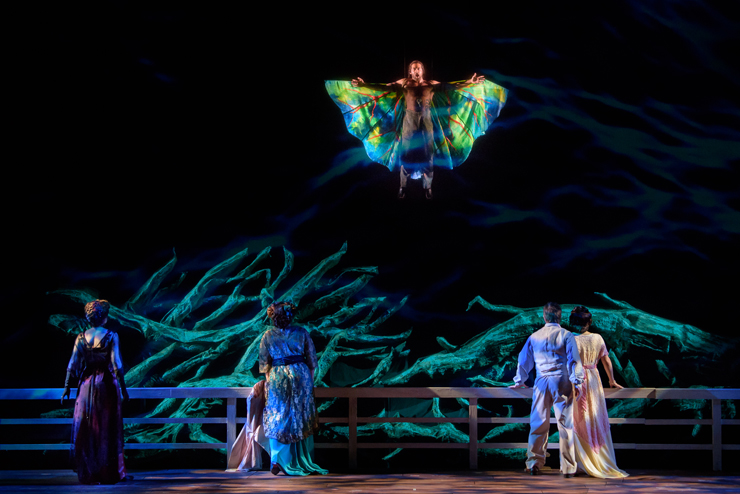
Photo credit: Chris Kakol.
Rooted in the genre of magical realism, a literary style that began in Latin America in the late 1940s and 1950s (think Jorge Luis Borges, Gabriel García Márquez, Isabel Allende), “Florencia” blends the ordinary with the extraordinary, where supernatural elements materialize in an otherwise real-world. It blurs the line between reality and fantasy and the characters in the story accept both as the norm. In short, it is a genre that allows the writer to be more expressive beyond the limits of reality.
Catán had obviously turned to García Márquez as a muse; though the location of his opera is centered around the real city of Manaus in the Brazilian state of Amazonas, semi-isolated in the heart of the Amazon rainforest, it’s not unlike the mythical Columbian town of Macondo, the setting of Márquez’s “One Hundred Years of Solitude,” or the unnamed port city central to the story of “Love in the Time of Cholera.”
This story is wholly the work of Catán and librettist Marcela Fuentes-Berain, a student of García Márquez, though Márquez’s influence on character is evident in the opera.
Our Florencia is returning home after many years to pursue her long-lost lover, Cristóbal, who disappeared while searching for the rare Emerald Muse butterfly. Compare Florencia’s character to Florentino in “Cholera,” who remained spiritually connected to an absent lover for five decades. We have the ship Capitán’s nephew, Arcadio, sharing the name of the Greek province Arcadia, a poetic byword for an “idyllic vision of unspoiled wilderness.” Reminiscent of “Solitude’s” mysterious Melquíades, is Ríolobo, a mystical, shape-shifting character, like the flexible, versatile and adaptable Ancient Greek Proteus, capable of changing form at will and having the power to fix unfixable events.
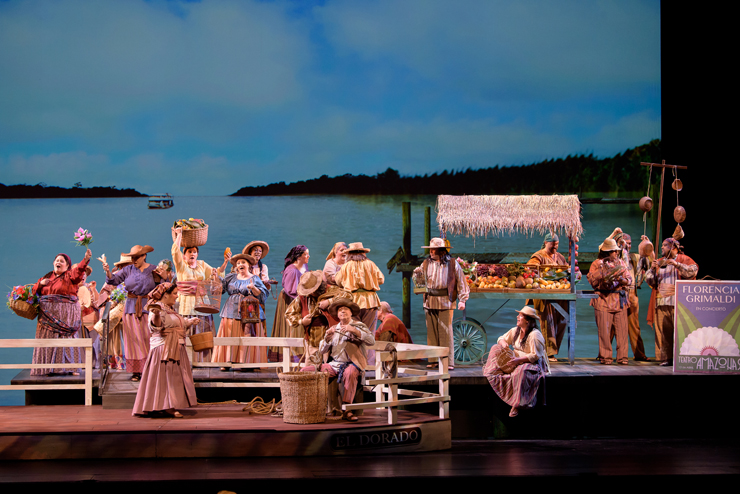
Photo credit: Chris Kakol.
Opera by nature amplifies emotions and when you add magical realism to the mix, you get one mighty big story. One might argue that “Florencia” would do just fine as a magically realistic play, but devoting it to the medium of opera, takes it to a level beyond what the genre’s short stories, novels and films can provide.
Soon after its premiere in 1996, Catán’s “Florencia en el Amazonas” entered the operatic canon as a unicorn – it wasn’t Italian, German nor French – but had a Spanish libretto.
Catán and Fuentes-Berain mined love – young love, old love, unrequited love, love for the river and love for a steamboat – all angling towards Teatro Amazonas, the unlikely opera house in the Amazonian rainforest. All their stories are about to collide with supernatural forces as they travel down the Amazon River, causing profound transformations, requiring the audience to suspend disbelief, which wasn’t hard to do with Catán’s lush, lyrical and melodious score.
The conceit followed Rosalba (soprano Cecilia Violetta López), a journalist/No. 1 fan of the famed soprano Florencia Grimaldi (soprano Anna Maria Martínez), having spent the past two years preparing to write a book about the elusive diva; Paula (mezzo-soprano Mariya Kaganskaya) and Álvaro (baritone William Lee Bryan), an older couple hoping to resuscitate their marriage with a trip to the exotic place to hear the great Grimaldi sing; and the diva herself, who is never spotted in public as she goes to great lengths to hide her identity offstage. We meet up with the Capitán (bass-baritone Rafael Porto), his nephew Arcadio (tenor Andrew Bidlack), and ship's mate/river god Ríolobo (baritone Steven LaBrie), who somehow is able to pull off a mysteriously happy ending.
Stage director Jose Maria Condemi has assembled one of the most consistently credible casts heard and seen on the FGO stage. Each singer portrayed their reality honestly with voices as consistently strong and flawless as their characterizations.
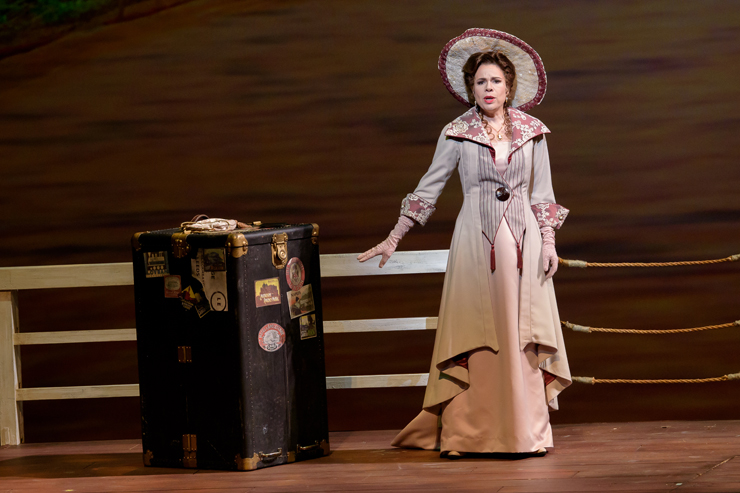
Photo credit: Chris Kakol.
Since her memorable performance 10 years ago as Fiordiligi in FGO’s production of Mozart’s “Così fan tutte,” Martínez has returned to FGO a popular international diva. Martínez brought Florencia to life with a chest-voice that resonated as luxuriant as her luminous highs, her supple quiet moments as attainable and captivating as her commanding power notes.
In order to pursue a career as an opera singer, and having scorned years earlier the man who taught her body “to feel passion” claiming that her voice grew as a result of their intimacy, Florencia is now aboard the steamboat that has set sail for Manaus. She is anxious to return home as she promised after her triumphs, hopeful (and certainly delusional) to reconnect with the man who inspired her and has since disappeared into the jungle.
Martínez essayed her aria with incredible control, her instrument as subtle as it was powerful, keeping her passion front and center while suppressing the implausible nature of Florencia’s mission. She sang “…you said you would wait for me always…,” the brass behind her voice amplifying the emotion, sliding beautifully into her upper register and boldly into her lower, having us believe that she just might find this guy.
After the shipwreck, Florencia asked a photograph she carried of Cristóbal, “…is this death…is this my body or spirit that will wander in eternal solitude?” – Martínez honestly caressing her high notes as if she was speaking softly to her lover. In her final aria, having been prevented from singing due to an outbreak of cholera in Manaus and making a last-ditch effort to connect with her ‘bright elusive butterfly of love,’ the pretty brunette luxuriantly surrounded her notes, her voice and orchestra swelling and tugging at the audience as a small blue butterfly grew ever-larger on the screen, leaving us to wonder if it was Cristóbal coming into view or Florencia morphing into the colorful creature.
López, playing the star-struck writer Rosalba, avoided the over-the-top trap such a role might encourage, instead playing with nuance and caution, giving us a deeper look into the character. Her soprano was strong, her cat and mouse duets with Bidlack expressive of the wariness of as well as interest in Arcadio. (We never find out why Rosalba at first appeared so disheartened about love, a flaw in the libretto, an additional hurdle for López to overcome, which she did, as there was no backstory for her to draw on.)
López and Bidlack combined their considerable chops in the wonderful Act 2 duet, where Rosalba and Arcadio parsed love, having “…seen lover’s souls torn apart…with tongues like razors…couples who no longer love each other but sleep beside each other….” López flawlessly hit several money notes, kept her passion at bay while letting us glimpse it bubbling beneath the surface, as she and Bidlack gorgeously rode the argument as it rose and fell with the swelling music.
A duet between two sopranos is always lovely, and was evident when López and Martínez teamed up as Florencia sagely prompted Rosalba to “let go of the unhappiness of fear” and suggested that “…love is not a prison but a vast ocean…let it in and you will become the writer you have dreamed of being….” Their combined voices were splendid together.
A harp ascended deliciously as did Bidlack’s satisfying tenor, painting pictures to Rosalba as he shared his dreams of becoming an airplane pilot. Porto genuinely conveyed his dedication and love for the steamboat El Dorado, his bass-baritone pure, especially in his higher register, bringing a soft gravity to his scene with Bidlack, their voices blending nicely as he encouraged his nephew to become a steamboat captain like all the men in his family had done. His scene explaining to Florencia that “Cristóbal found the heart of a beautiful woman instead of a butterfly” exposed Porto’s tender side.
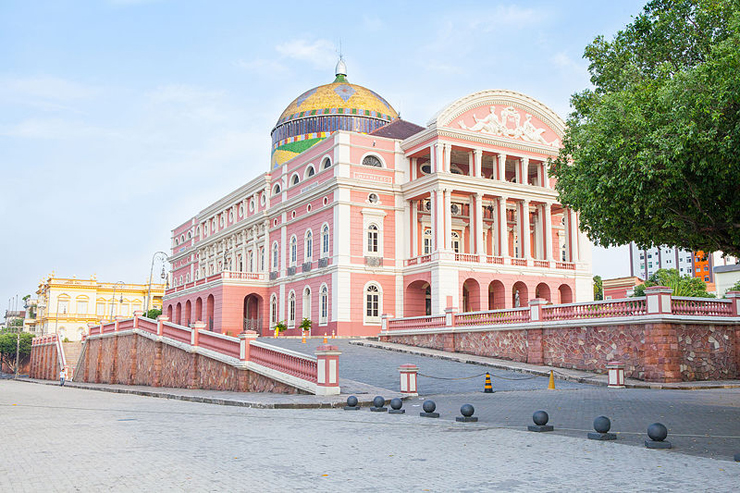
Teatro Amazonas, the unlikely opera house in the Amazonian rainforest.
The river, certainly a character in this work, was embodied in the score as well as in Ríolobo, the sturdy long-haired baritone LaBrie making fine work at being the conduit between the real life on the boat and the fantastic element encountered along the otherworldly way. Whether he was suggesting to Rosalba that she may find love, observing that the gleam of love had grown dim between Paula and Alvaro, or showing up with wings to implore the angry River to show mercy, his ample baritone was imbued with character. Serving as deus ex machina, he appeared suddenly to repair the broken ship, resolving the improbable forces of nature and bringing order to the chaos.
Kaganskaya brought a full and vibrant mezzo to the stage upon losing her husband overboard after the storm. Holding his jacket, realizing that too much time had passed since she said “I love you” (the consequence of too much pride), Kaganskaya delivered her aria with heartfelt believability.
The laughline of the evening came from a conversation between Kaganskaya and Bryan during a card game with Bidlack and López, Paula complaining that “the air on the river was unbearable” and Alvaro replying, “Then don’t breathe.” The four voices made for a fine quartet. As the storm encroached on the boat, the entire ensemble raised their collective voice in spectacular harmony.
Catán’s palette is robust, painting romantically broad strokes that are rich, lush and often cinematic, with soaring melodies atop and sonorities portraying inner emotions. His style is also contemporary in that he doesn’t telegraph “here comes an in-your-face wonderful aria,” but rather the arias, duets and ensembles rise organically from the text, through-sung like dialogue underscored with glorious music, bringing more depth and layers to the words and characters. Arias are like interior monologues and the duets like conversations loaded with subtext, inviting the audience to get in touch with their own emotions.
For example, he adds a mounting musical passage to the ordinary occurrence of a married couple bickering over what to order for dinner (“I said no, you heard yes…,”) amplifying the deepest realm of what’s really going on beneath their conversation.
Catán elevated the Spanish language to the height of Italian lyricism.
Whether it is coincidental that “Love in the Time of Cholera” is a sentimental story about the enduring power of true love or García Márquez's main notion that lovesickness is literally an illness, a disease comparable to cholera, these themes played well in both his novel and Catán’s opera. In the complete oeuvre of contemporary opera, “Florencia” floats to the top of the list. Perhaps the magic in the realism gives us greater access to our interior beings, always both clear and cloudy, providing otherwise unrealized insight into our souls.
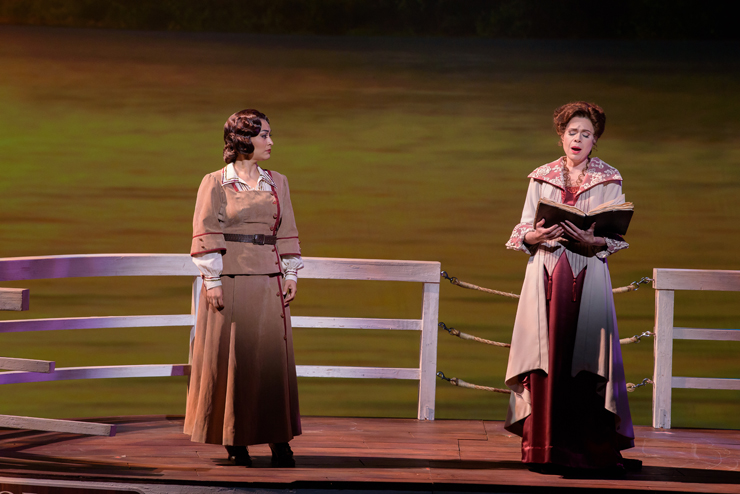
Photo credit: Chris Kakol.
Maestro Ramón Tebar helmed the spectacular FGO orchestra down the mighty Amazon, the panoramic score inclusive of European traditions laced with marimba and steel drums. The soundscape included several passages of harp, flute, clarinet sounding of running water, birds and butterflies, brass, winds and percussion offering up the jungle, the animals and the river, and soaring strings bringing the motion of the steamboat navigating.
The minimal set of Phillip Lienau, largely a long steamboat deck, was the functional playing space. Scrims of an old-world map of the Amazon River at top of show and a tangle of branches after the storm were well done. The lighting by Kenneth Yunker augmented the rich colors of projected flowers along the Amazon, lightning flashes and the vibrant colors of Manaus turning florescent purple and green as cholera closed in on the city. Elizabeth Poindexter paid fine attention to detail with her Edwardian style costumes.
It should be noted that, in this age of cost cutting (it easily costs $1.5 million to mount an opera), an innovation that’s saving significant dollars is projection, used here to impressive effect as well as allay significant costs. Aaron Rhyne’s images, projected onto an upstage backdrop, transported us to ship docks, down the Amazon river, through a massive rainstorm and to the city of Manaus.
The capacity crowd gave this sublime combination of a stellar cast in terrific voice, a richly developed score played by a supremely confident orchestra in an imaginative, magically realistic setting, an enthusiastic and sustained standing O.
Continuing with the efforts of FGO general director Susan Danis’s vision to present a mix of opera’s greatest hits with more contemporary offerings, FGO’s 2018-2019 season will include “La bohème,” “The Marriage of Figaro,” “Frida” and “Werther.”
Florencia en el Amazonas
By Daniel Catán; libretto by Marcela Fuentes-Berain; conductor, Ramón Tebar; stage director, Jose Maria Condemi; production, Opera Colorado; sets by Phillip Lienau; associate set designer, Maya Linke; lighting by Kenneth Yunker; costumes by Elizabeth Poindexter; wig and make-up by Sue Schaefer; chorus master, Katherine Kozak; assistant conductor, Joshua Horsch; production stage manager, Liam Roche; projection designer, Aaron Rhyne; FGO general director, Susan T. Danis
CAST: Florencia - Anna Maria Martínez, Ríolobo - Steven LaBrie, Rosalba - Cecilia Violetta López,Arcadio - Andrew Bidlack,Paula - Mariya Kaganskaya,Álvaro - William Lee Bryan,Capitán - Rafael Porto
Remaining schedule | Florencia en el Amazonas
an opera in two acts, lasting 2 hours and 20 minutes with one intermission
Sung without amplification in Spanish with projected titles in English and Spanish.
Miami Adrienne Arsht Center / Ziff Ballet Opera House
1300 Biscayne Blvd, Miami, FL 33132
Tuesday, May 1 at 8 pm
Friday, May 4 at 8 pm
Saturday, May 5 at 8 pm
Audio Description provided by the Arsht Audio Description Volunteer Team is available without charge for blind and visually impaired patrons attending Arsht Center operas and Broadway shows.
Ticket purchases can be made online at www.FGO.org or by phone at FGO’s Box Office (800) 740-1010.


